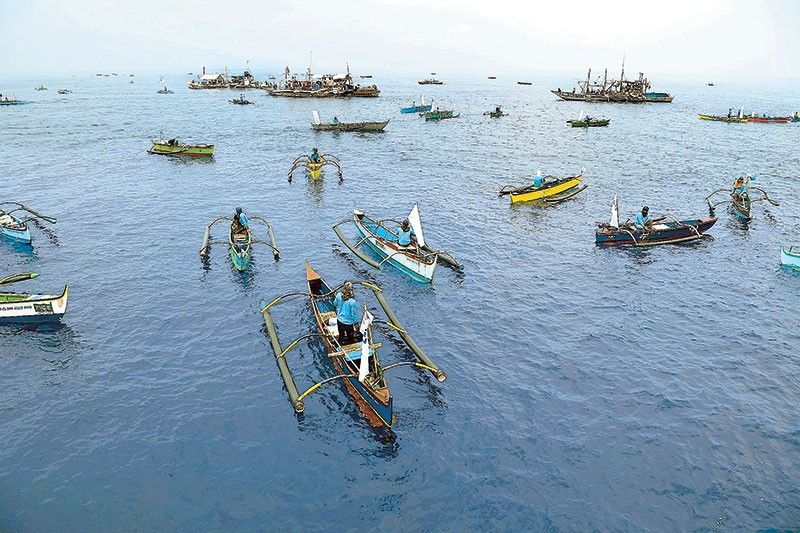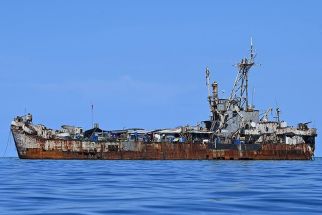Philippines: Protecting sea resources 'key to peace' amid South China Sea tensions

MANILA, Philippines — Southeast Asia must build stronger maritime governance based on science and international law to protect both regional peace and the millions of people who depend on its seas for survival, the Philippines' top diplomat said.
Amid rising tensions in fiercely contested waters, Foreign Affairs Secretary Enrique Manalo said maritime issues now extend beyond traditional security concerns to include ocean resource management, marine environmental protection, and the welfare of coastal communities.
"An area of critical importance is the governance of the global commons, the spaces we co-inhabit, in particular our maritime commons – for ours is a maritime region," Manalo said in his keynote address at a forum on Thursday, January 9 in Singapore.
The Philippines' top diplomat described the region's waterways as lifelines that connect nations and sustain millions of coastal communities. "Getting governance right in the maritime commons, and applying the best of science, international law and norms to manage them, are key to maintaining peace in the region," Manalo told an audience of policymakers, diplomats, and academics.
The Philippines' top diplomat highlighted how Manila has expanded its maritime initiatives in recent years, pursuing joint patrols with Indonesia and Malaysia in the Celebes Sea and cooperative activities with the United States, Japan, Australia, Canada, France, India and New Zealand in waters the Philippines has sovereignty over.
Despite escalating tensions between China and other co-claimants states in the South China Sea, Manalo pressed upon the need for Southeast Asian nations to "push the frontiers for possible maritime cooperation."
Manalo outlined a range of activities that spans from improving regional awareness of maritime activities to protecting ocean resources. He emphasized that the United Convention on the Law of the Sea (UNCLOS) should guide all these cooperative efforts, from ensuring freedom of navigation to managing fisheries and natural resource extraction.
The Philippines recently took steps to bolster its maritime governance framework with the passage of the Philippine Maritime Zones Act in November, which sets the meters and bounds of the country's maritime zones in accordance with UNCLOS.
Beyond deterring China, maritime expert Julio Amador III believes the new law can lead to an opening for the Philippines to start maritime boundary talks with Malaysia and Vietnam.
The Philippines shares overlapping claims with Vietnam and Malaysia in several parts of the South China Sea.
RELATED: China protests new Philippine law that could start ASEAN maritime border talks
Code of conduct gains urgency
The foreign affairs secretary also emphasized the urgency of passing a code of conduct (COC) in the South China Sea between the Association of Southeast Asian Nations and China, noting that formal negotiations have been ongoing for about six years.
Talks of a regional code of conduct to mitigate the risk of conflicts in the fiercely contested South China Sea have taken place for over two decades. It was only in 2018 that ASEAN and China agreed to a draft negotiating text that served as the basis for the code of conduct itself.
However, key issues remain unresolved. At the last ASEAN summit in October, President Ferdinand Marcos Jr. pointed to ongoing disagreements over geographic scope and the legally binding nature of the code.
RELATED: Sincere dialogue with China on code of conduct unlikely, says Teodoro
China continues to assert its claims over nearly the entire South China Sea, defying a 2016 ruling by the Permanent Court of Arbitration that declared its claims have no legal basis. The landmark ruling upheld the Philippines' maritime rights but has done little to curb Beijing’s actions in the contested waters.
Alongside China and the Philippines, Vietnam, Taiwan, Malaysia and Brunei also stake competing claims over the vital waterway, which remains a flashpoint for territorial disputes in the region.
"It is even more important now that ASEAN countries and China persevere in delivering a credible and effective Code of Conduct anchored on international law," Manalo said.
The urgency for a COC has intensified due to "continuing disputes and tension in the South China Sea," Manalo said, as well as "actions against the lawful pursuits of countries such as the Philippines in our Exclusive Economic Zone."
Stressing ASEAN's role as a peacemaker, Manalo said the regional bloc must now "prevail in the face of major power rivalries and common challenges."
"Building for peace in the Asia Pacific requires a robust latticework of multilateral, regional, sub-regional and bilateral dialogues, arrangements, partnerships and initiatives," Manalo said.
The foreign secretary added that while ASEAN remains relevant, the region should be open to exploring other multilateral or regional dialogues that could complement the bloc's existing frameworks.
"I believe challenging or turbulent times more often than not compel states to seek cooperation with others," Manalo said.
"And the Philippines has also been consistent in this message: that if the international community is to be resilient amidst global winds of change, then the rules-based international order should underpin such cooperation," he added.
- Latest
- Trending






























